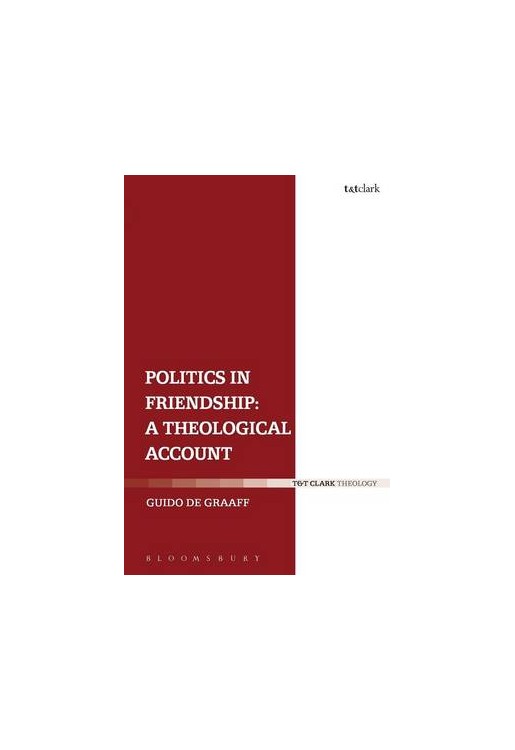Guido de Graaff explores the political dimension and significance of friendship, arguing that its specific contribution lies not only in its theological approach, but also in its particular focus distinguishing the 'political' from the 'social' and/or 'civic'. The book's explorations are framed around a particular story of friendship: the story of Bishop George Bell and German theologian Dietrich Bonhoeffer. Drawing on Hannah Arendt and Oliver O'Donovan, de Graaff argues that Bell and Bonhoeffer's story can be read as one of friends assuming the responsibility of political judgment in an emergency situation - their story casts doubts on secular politics as the primary context for interpreting the friends' judgments. Thus the book provides a more comprehensive account of the story, also interpreting it against the background of the life of the church (with special attention to John 15 and Romans 12). De Graaff concludes by showing how a theological account is vital for discerning the distinct politics of the church, including opportunities for Christian engagement in secular politics. De Graaff's book is lucid, clearly argued and a valuable contribution to a theology of friendship, and to moral theology more generally. -- Preston Parsons, University of Cambridge, UK * Theology * This book is highly recommended for those who wish to further understand the important place of friendship within the polis and the ecclesia. It also serves as an important expository document for the relation of Bell and Bonhoeffer for those interested in research on either of these two important twentieth century figures. * Theological Book Review * Friendship has sat uncomfortably on the edge of moral and political thought in the modern West, never quite accommodated to the ways in which we discuss either individual or political life. In his exploration of the political resources of friendship De Graaff, like Cicero in antiquity, takes an historical pair of friends to think about, and by interrogating the example of Bell and Bonhoeffer, opens our eyes to important and exciting currents in friendship that have suffered from persistent neglect. * Oliver O'Donovan, University of Edinburgh, UK * There is renewed and welcomed interest in friendship as a crucial constitutive part of the moral life. Guido de Graaff draws on much of that literature but with a creativity that is truly remarkable. In particular, how he understands the relationship between friendship and politics and displays how that transforms "the political" is an exemplification of the kind of work we so desperately need in Christian theology. Moreover, by concentrating on the relation between Bonhoeffer and Bishop Bell we are able to see how friendship is at least one way in which friendship can create a community that can limit the political. * Stanley Hauerwas, Duke Divinity School, USA * This book presents a fresh, narratival approach to contemporary political theology. Recent work in political theory and philosophy has revived interest in classical themes of civic friendship and the common good. Friendship in Politics engages these discussions with conceptual rigor and insight, drawing from biblical and theological sources in ways that affirm and challenge these developments. Such scope, nevertheless, risks abstraction. By focusing on the concrete practices of friendship embodied by George Bell and Dietrich Bonhoeffer during the political crises of the 1930's and 1940's, the author resists this temptation and introduces a novel account of discipleship and citizenship in the modern world. It is difficult to think of a comparable work on friendship and politics. * Eric S. Gregory, Princeton University, USA * Through the story of Bishop George Bell and Dietrich Bonhoeffer's friendship amid 'dark times' De Graaff develops a theologically rich, analytically sophisticated and compelling account of the relationship between friendship and political judgment. It is an account which is attuned to the disjunctures and connections between classical, Christian and contemporary political thought and the relational basis on which Christians are called to exercise faithful witness. * Luke Bretherton, Duke Divinity School, USA *
Acknowledgements
Introduction
Chapter 1. Friendship and Politics: Initial Explorations
I Descriptions
II Choosing a Perspective
III Friends in Earthly Cities
Chapter 2. A Story of Friendship: Bell and Bonhoeffer
I Ways towards Friendship
II The Story
III The Friendship
Chapter 3. Common Action
I Aristotle: Friendship in the City
II Arendt: Politics as Acting Together
III Bell and Bonhoeffer: Acting Politically?
Chapter 4. Common Judgement
I Responding to Evil
II Judgement as Political Act
III Judging Together
Chapter 5. Friends Judging in Times of Crisis
4
I In the Company of Judgement
II Judgement in Repentance and Forgiveness
III Spectatorship or Obedience
Chapter 6. Ecclesial Judgement
I Jesus' Gift of Friendship (John 15)
II Mutual Submission in Service (Romans 12)
III Judgement Received in Friendship
Chapter 7. Friends in the Church and Political Society
I Friendship within the Body of Christ
II Friendship and Political Responsibility
III Conclusion
Appendix 1: Excerpt from Bell's Diary
Appendix 2: Die Stuttgarter Schulderklarung / The Stuttgart Declaration of Guilt
Appendix 3: 'Der Freund' / 'The Friend'
Bibliography
Index


